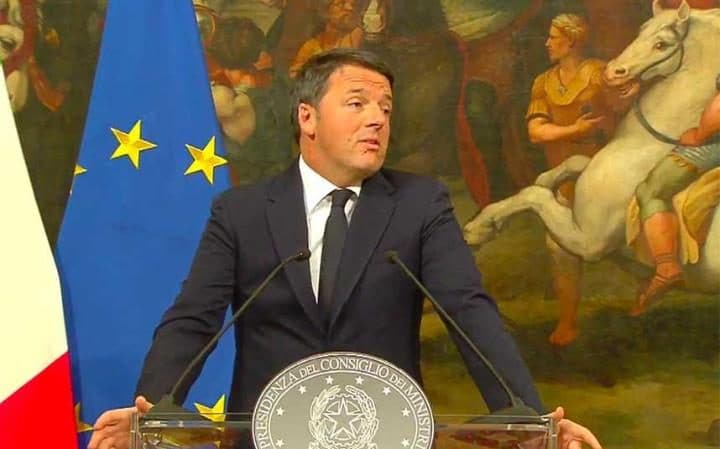By Annalisa Cappellini (King’s College London)
The Italian Constitution seems to be the biggest winner of the referendum on constitutional reforms that took place yesterday in Italy: in an era of political disengagement and low electoral participation 70% of Italian voters went to the polling station to have their say on its proposed modifications; over 19 million people (60%) said “no” to such changes. They said “no” to a reform the seemed to be both too rushed and badly written.
Matteo Renzi, on the contrary, appears to be biggest loser of this referendum, that he himself decided to turn into a vote on his government. He took a gamble, like Cameron did with the Brexit vote; Renzi took this gamble when all the political circumstances were in his favour but then the wind changed and he got wiped out, like many others political leaders.
The core of the proposed reform wanted to make the elected Senate a chamber of representatives from the regions and municipalities – while giving the representatives some immunity – to abolish the “perfect bicameralism” and to strengthen both the government and the Prime Minister’s powers. Renzi decided to run the campaign for this referendum as it was a vote on the achievement of his government so far, a vote for or against him. The results do not leave room for misinterpretations.
And yet this vote in Italy resembles the popular revolt that saw the forgotten social classes voting against the European establishment in the Brexit vote and against the American political establishment represented by Clinton. In this vote it is possible to find the same malaise, distrust and anger that is spreading across the western democracies. But Renzi, of this malaise, was perfectly aware; it was the very reason of his initial success. It was indeed thanks to his campaign against the old political establishment (la casta), against the old generation of politicians that run the country for the past few decades that in the spam of 5 years he turned from mayor of Florence to the leader of the largest political party and Prime Minister of Italy. He thought that with his motto “Rottamiamo” he was interpreting and giving answers to the demands of millions of frustrating citizens, tired of seeing the old politics tearing the country apart. However, he failed to really engage and deal with this silent revolt that is spreading all around contemporary democracies and he got punished, like it happened to Cameron first and Clinton later.
Within this vote there is the clear demand from the people to go back to the real politics, to deal with the issues that are affecting their lives. With this vote Italians have decided to send a loud and clear message to the political class as a whole, a political class that is detached from reality, from the people, from the territories. For example, over 80% of young people, who face an unemployment rate of over 40% and who have been fleeing the country in droves, strongly voted “no”. Matteo Renzi wanted and asked for a political vote, he got one and it clearly says, beyond doubts, that politics has failed the people.
It is striking to look at the map of the vote, if the “no” would have been just the product of party factions we would have surely found a differentiation of the votes according to areas, among, let’s say party lines, and yet we see a surprising homogeneity of the results; there is not distinction between North and South or West and east. There is simply a strong loud “no”, to Renzi’s government and to the one that will follow.
In fact, this detachment between politics and people will remain even after Renzi and his government will be gone and it needs to be seriously addressed. If other political actors, like the Five Stars Movement (M5S), that are now cheering as they see their opportunity to get into power, will not be able to re-build the broken relationship with the citizens by giving concrete answers and abandoning the vagueness of an almost non-existent programme, they will be condemned to an even quicker end.
The country needs somebody with the vision and the courage to move beyond the logic of the business as usual, but first off all it needs an electoral law able to provide both representation and stability. In fact, as surprising it may seems, Italy at the moment does not have a proper and coherent electoral law, while the last three Parliaments were found to be elected with rules later proved to be unconstitutional. If the country would go to election at the time we write, two electoral laws would indeed regulate the elections: a majoritarian one (the so called Italicum) for the Upper House (Camera dei Deputati) and a proportional one for the Senate. With this system none of the key political poles into which the Italian political landscape has split – centre left, M5S and centre right – would be able to win a majority of votes needed to form a government supported by both chambers. Thus, the most likely scenario of any election would be a sort of grand coalition unable to make the changes that the country desperate needs.
Hence, the priority is now to provide Italy with an electoral reform able to guarantee a legitimate and stable legislature; the political parties from their sides need to reconnect with the citizens, they need to rethink and propose a serious project to govern and to reform a country that is dangerously on the edge of a collapse.
Italy needs to go back to politics, politics needs to go back to Italy.
Photo Source: http://www.telegraph.co.uk/news/2016/12/05/europe-turmoil-matto-renzi-resigns-losing-referendum-austrias/


